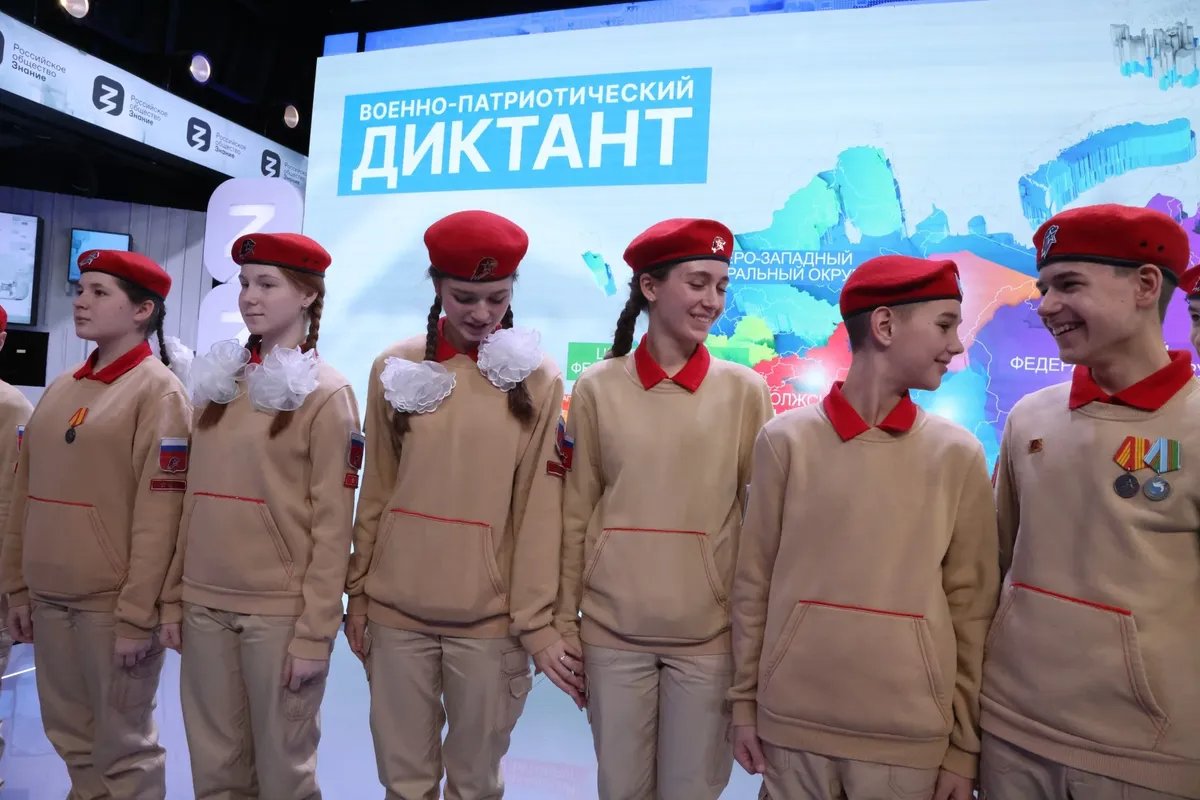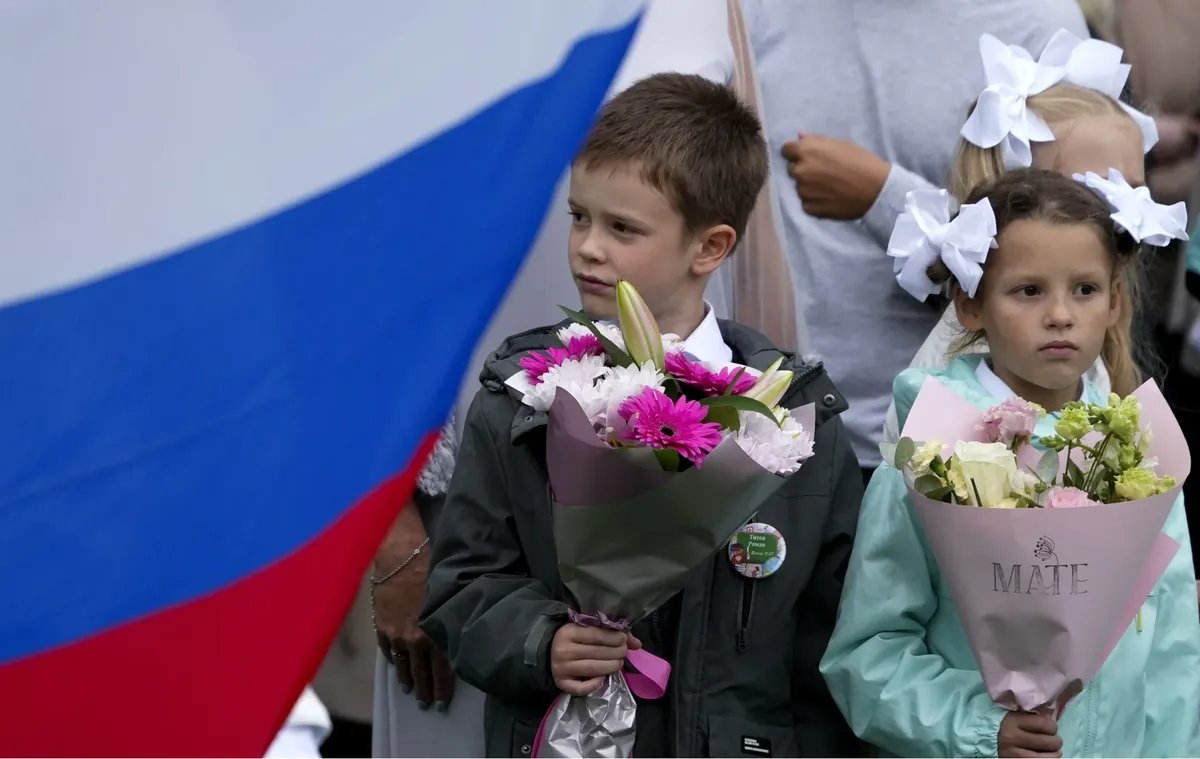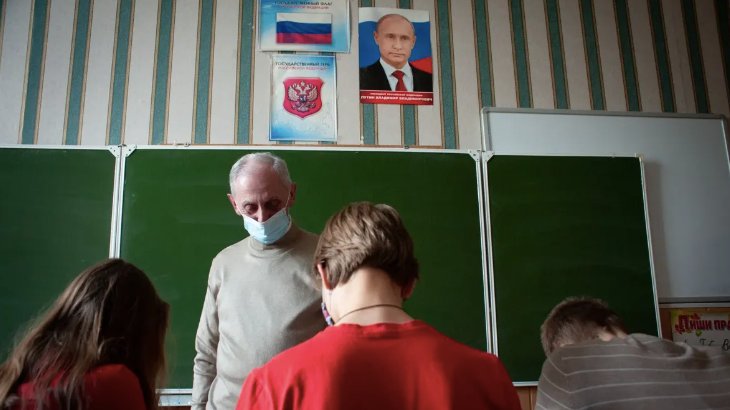Novaya Gazeta Europe has already written about how propaganda in schools impacts students and their mental health. But not everyone who works in these schools uses the [state] language from television to explain the goals of the “special military operation” to children — nor are all teachers ready to write denunciations of students who disagree with them. Exclusively for Novaya Gazeta Europe, Yekaterina Krasotkina talked with teachers opposed to the war and found out what kinds of compromises they have had to make in order to continue telling children the truth.
‘There is veiled language, there are personal conversations’
A teacher of history and social studies from Central Russia (asked to speak anonymously due to safety concerns):
The school administration is aware of my antiwar position. In February and the beginning of March, when it was possible to express [this opinion], I did so: I wrote posts on social media, signed open letters. After they passed the law about fake news and discrediting the army, [this behaviour] became dangerous and could serve as a reason for opening a case.
I stopped speaking out openly; I understood that there would be no sense in that. Better for me to keep my freedom and use all means available, including at school, to advance an antiwar agenda.
There’s veiled language, and there’s private conversations: I still have tools that allow me to influence the worldview of society, so that it doesn’t go to militarism and rabid patriotism.
When in school they introduced flag-raising and the anthem, I was opposed to this. If they had introduced this under better circumstances, when the country wasn’t engaged in any kind of aggression, but was building a fair society, I might have been able to stand behind this. But under these circumstances, it doesn’t look very good.
It’s not possible, of course, to speak frankly with the children about this; there’s a danger that one of the children will tell someone that the teacher is speaking out. I could discuss all this only with the students, in general the older students, who have already formed critical opinions about what is happening.
I lead the “Important Conversations” program like this: I play a video suggested by the [ official state] syllabus. If there’s something we can analyse there, we try to discuss that. But often you can’t find anything to analyse.
I actually know teachers who refuse to conduct these classes on principle. But I don’t support this. Which is better — that the classes are Ied by me, a teacher with a critical position, or that they are led by someone with a pro-war view?

Photo: Contributor / Getty Images
In general, I believe that with the correct approach, these classes can even develop critical thinking skills. A student from another class, in which the classes are led strictly according to the syllabus, asked me: “What’s the point of showing us these lessons — so that we’ll go off to war later on?” I answered, “Probably, yes.” And he said, “Having seen these videos, you not only don’t want to go to war, but you won’t want to go anywhere at all — they provoke disgust.”
It’s also possible to form critical thinking in regular classes. In the history program, beginning with 6th grade, there are so many examples of how military campaigns end: with disappointment and human suffering. The children themselves understand that the current situation is very similar.
Observing the events that are happening now, I understand, first of all, that at some point I’ll have to leave this school. It won’t be possible to work there. But I think that all the same I’ll stay in education. I hope that I can find demand for my educational services: online, as a tutor.
If that doesn’t work out…Many teachers have taken up various second professions because the salary is so low. I, for example, have worked in construction and know how to do a lot of things. But of course, I’d rather stay in education. It’s important, especially now.”
‘The administrative representative started screaming at me, saying that some of my heroes are Armenians’
Tatiana Chervenko, maths teacher from Moscow
“I taught mathematics to 7th and 8th graders. When the war began, I went to a protest. I got arrested, and we were held at the police station for seven hours. Ultimately, I was charged with rallying and paid a fee of 20,000 rubles.
I explained to the children in class that a very bad time has started and it’s possible that things will be very hard for us. I didn’t say specifically that Russia attacked Ukraine. I just compared what’s happening with the last books of “Harry Potter”: the heroes lived under the rule of Voldemort, it was bad, hard, but they continued to do what they could. And this time passed. In the end everything ended with the victory of good [over evil].
I didn’t say anything more. The children knew what my position was. I understood that there are various views among the children’s families. I’m not trying to change anyone’s mind. I didn’t tell them that I participated in a protest: that’s my personal affair. They learned about that later from rumours and the media.
Sometimes during breaks or after classes, some children would ask me questions about what was happening between Russia and Ukraine or share that it was hard for them. When in the summer the school started preparing for the “Important Conversations” program, I knew that I didn’t want to lead these classes. Whatever they say, it all comes down to propaganda.
I decided that I would conduct extra maths lessons during this time. The parents weren’t opposed.
But also in the summer a denunciation was filed against me at the Department of Education. The author of the denunciation included the link to an interview I gave with Deutsche Welle, where I talked about the protest.
I believed it was important to give that and subsequent interviews. Many people think that in Russia everyone agrees with what’s happening. But that’s not true — many people don’t agree, but they’re just silent. I wasn’t able to go to protests anymore because of the threat of a criminal case, and I have a young child. I did what I could.
The school didn’t react at all to the first denunciation, but the second, it seems, began to have an effect. Apparently, a directive came from the children’s rights commissioner to fire me, and the school acted in this direction.
Representatives of the school administration began to come to the “Important Conversations” class where I taught maths. They gave me an [official] reprimand for deviating from the topic.
In a recent lesson about heroes, I chose peaceful examples not connected to war: I talked about Shavarsh Karapetyan, who in 1976 saved 20 people from a trolleybus that had fallen in the water, Stanislav Petrov, who prevented a nuclear war in 1983, and Ramazi Datiashvili, who reattached the legs of the Lithuanian girl Rasa, also in 1983.
I ended up saying that heroes are good, but that what makes them become heroes was someone else’s negligence. There isn’t a hero for every instance of negligence. And the truest form of heroism is to do your job well.
After class the children headed toward the door, and the administrative representative who had attended the class started screaming at me, saying that some of my heroes were Armenians, and I should have talked about Russia (although my examples were all from what was then the USSR, whose legal successor is Russia).
In the beginning of October, the school gave me another reprimand: this time because I gave an interview on TV Rain about my attitude toward “Important Conversations.” And at the end of October, I was arrested right in the middle of a lesson — following a complaint from the school, it seems.
The security forces carried themselves very insistently when they were trying to put me in the car. But they didn’t introduce themselves, they didn’t want to take off their masks. They tried to get an explanation from me about the TV Rain interview, and they wrote me a warning not to go to any more protests.
I sued the school over the two reprimands. On December 2nd the decision was announced, not in my favour. The school waited until the trial ended and after that they fired me.
In the beginning of January my lawyer and I submitted an appeal of this decision, and before the end of the month we will file another suit about the illegal dismissal.
Right now, I’m giving private lessons. Of course, I’m used to having my own classes, to different children. They said goodbye to me with tears in their eyes. I will try to keep in touch with them. If they need help, I will be happy to give them classes over Zoom. But I don’t want to return to school, to experience that pressure again.

Photo: Contributor / Getty Images
‘Understanding the situation in the country, I didn’t want to expose the children’
A middle-school teacher from Siberia (asked to speak anonymously due to safety concerns):
“I teach at the school that I myself attended. Last year I taught history, among other things, but this year I intentionally gave up these classes in favour of other disciplines. Given all the events that are happening, I just can’t teach history. It’s awful.
If there weren’t all these repressive laws, I would go to protests, stand at pickets. I have a young child who has problems with his health. I understand that if I’m arrested, there won’t be anyone to take care of him. If I weren’t in this situation, maybe I would more actively speak out about my views and convictions in school.
I am a head teacher assigned to a class. In the class there are kids whose relatives live in Ukraine. In February we started to hear accusations from some students: “You’re [slur for Ukrainian].” I took a harsh position on this, I said that incitement of hatred because of national identity is unacceptable, it’s a crime.
All the children are familiar with my position, I consistently promote it in all of our classes. For example, one time the children were looking in the atlas at a map of Europe. One boy started violently jabbing with his pencil at the part where Ukraine was pictured. I asked what he was doing, and he said, “I’m bombing them.”
I know that this is the position of his family and school. But I’m a fairly strict teacher, I sat him down and said that in my presence this attitude toward any group of people is unacceptable. Situations like this periodically happen — there’s a constant dialogue with the children. But I’m a fairly popular teacher, so far none of the students have complained about me.
We have good partnerships with our students. Many of these children come from difficult family situations. We don’t have a school counsellor. When children need to resolve a conflict or share some kind of problem, they come to me. They trust me: they know that our conversations will be private and won’t go anywhere.
After the 24th of February, the children’s anxiety increased. They understand that the situation in the country is changing. We have boys in 11th grade, some of whom will turn 18 immediately after they graduate. They understand that they can be drafted, and this is a threat to their lives. They have plans, aspirations, and now they are faced with the realisation that they might not have a future at all. It’s scary. I try to soothe them, to give them some kind of hope that maybe all this will end, I set them up to prepare for and enter universities.
I lead “Important Conversations'' with my own program, not the state syllabus. I have talked about Tsiolkovsky and flights to outer space, about nuclear energy. (The department of) education allows me to focus on these themes not connected with the “special military operation.”
But usually this takes 10-15 minutes, and the majority of the time we discuss concrete and important class themes — for example, how to resolve conflict, why electronic cigarettes are harmful. But if the children are interested, I can devote more time to a topic.
In the fall I wrote a blog post, in my own name, in a field-specific media outlet, about how I can’t talk about the greatness of the country in “Important Conversations,” when there are many problems in the school and the children don’t study under the most comfortable circumstances. A week after publication the school administration called me in for an extremely unpleasant conversation. I was reproached for “airing the dirty laundry”; they said that now there would be an inspection and [the consequences] would fall on all of us.
In November the order was passed down to us that the children had to write letters to Russian soldiers. I told the children that I didn’t have the right to force them to write these letters, but I also couldn’t stop them. About 30-40% of them wrote letters. With the children’s permission, I read them; there were many that I simply didn’t hand over to the administration. In [those letters] the children asked the soldiers not to kill. They wrote that they were scared, that they don’t want war. The letters were signed with the children’s names, and I was just afraid that if they ended up somewhere, there would be problems for the family. Understanding the situation in the country, I didn’t want to expose the children.
After the incident with publication, I told the director that I was ready to be fired. But to fire me in the middle of the school year would have been impractical; there’s no one else in the school to teach my subject.
If they fire me anyway, I’ll simply gather my things, take my son, and we’ll move to a different region. I’m not afraid of this — unlike the teachers who have worked in this school for many years and don’t want anything to change. But I feel responsibility for my students, so it would be difficult for me to leave the school. I understand that for some children I really am needed as an important adult [in their lives].”
‘From the opposite side there were always people on the payroll who waged a round-the-clock war with us’
Leonid Jalilov, maths teacher from Moscow now living and working in Montenegro
Even before the war, I went to opposition protests, but I was never arrested at any of these. Finally, I was arrested on February 24th. I didn’t go to court; they issued me a fine automatically.
Soon after that, we decided to leave the country as a family — we moved in March. There were various reasons for this. Part of it was that I am against any kind of repression of dissent, including antiwar demonstrations.
I lived through the Soviet era, when we said one thing at home and another thing at school and outside. I didn’t want to live through that again. And besides that, I understood that a big ideological burden would fall on my own children [if we stayed].
I have enormous respect for people who continue to work in schools and say some things directly, some things in veiled language, and who have to work under cover. But I want to say what I think openly, and to do so in safety. But it turns out that by leaving, it seems as though I lost my voice. It’s like, now I can speak, but there’s nothing particular to say.
When I taught in a Russian school, in maths classes we didn’t discuss what was happening, but in personal conversations it sometimes happened that [students] would ask me questions and I would answer them. Now I teach at a private Russian-language school, where there are children from Russia and from Ukraine: for me it’s important that I can do my part to help refugees. When we meet each other, I talk about myself, I say that I left Russia at the beginning of the war because I don’t accept this war.
The government propaganda has been extremely successful in getting people to distance themselves from politics in every possible way. Maybe we should have fought more purposefully against what has been developing in the country for several years, to engage in civic education.
During the Vietnam War, as now, it was often said that people who didn’t support the war weren’t patriots. But gradually society came to understand that this position wasn’t about being against your people, against your country — on the contrary, it was about being for these things; it wasn’t a betrayal or a crime, but a civic position. It’s possible that if we had played the speeches of Martin Luther King in schools, if we’d discussed peaceful protest, this attitude would be different. We really lack this kind of civic education.
Делайте «Новую» вместе с нами!
В России введена военная цензура. Независимая журналистика под запретом. В этих условиях делать расследования из России и о России становится не просто сложнее, но и опаснее. Но мы продолжаем работу, потому что знаем, что наши читатели остаются свободными людьми. «Новая газета Европа» отчитывается только перед вами и зависит только от вас. Помогите нам оставаться антидотом от диктатуры — поддержите нас деньгами.
By clicking the Support button, you agree to the processing of your personal data.
To cancel a regular donation, please write to [email protected]

